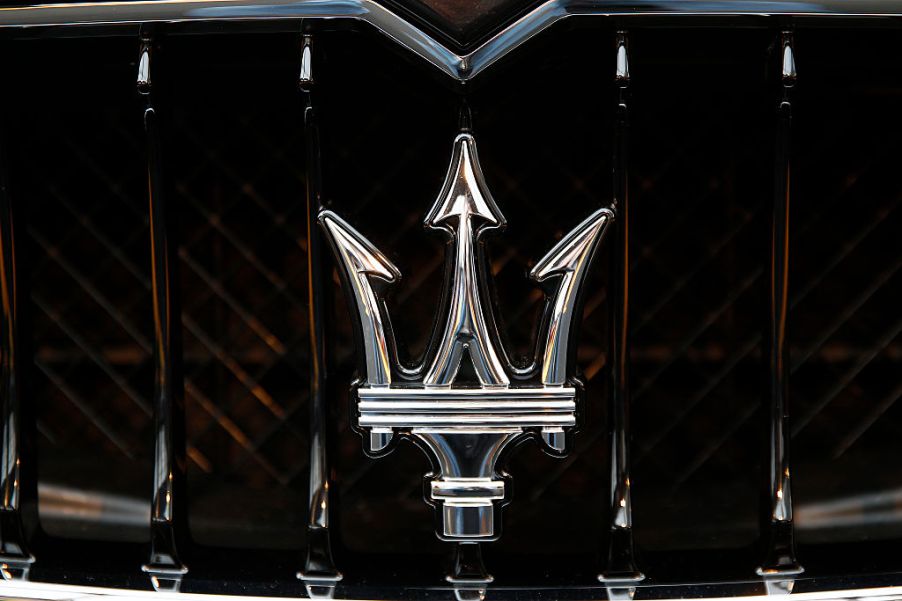
Maserati is a Luxury Car Brand Owned by a Familiar Face
Style. Power. Craftsmanship. Excitement. Italian luxury cars possess all of these characteristics. While German luxury cars are known for marvelous engineering, they seem a little cool and detached compared to their Italian counterparts.
And one particular Italian brand speaks this language of both opulence and intensity especially well: Maserati. But did you know this brand is owned by a company that also produces more affordable American brands? We promise that you’ll recognize the name right away.
The well-known company that owns Maserati
Cars such as the Levante SUV, the Ghibli sedan, and the GranTurismo grand tourer all boast breathtaking style and fierce high-performance engines. They are skillfully and lovingly built at Maserati’s assembly plant in Modena, Italy, as they have been for over 80 years.
And if you want to buy a car blessed with the trident badge, be prepared to plunk down serious coin starting in the high five figures or the low six figures.
So, maybe you think that a brand that makes Italian cars this exotic and expensive would be run by the Maserati family. Or, perhaps by another small but wealthy operation based in Italy?
The answer is no on both counts because the company that owns Maserati also happens to own more rugged, down-to-earth brands such as Jeep and Ram Trucks. That company is one of America’s Big Three. It’s Fiat Chrysler Automobiles, a global corporation and the eighth largest automaker in the world.
The buyout that saved an Italian luxury brand
On the continuum of style, performance, and function, it’s obvious that there’s a big stretch between the Jeep Gladiator and the Maserati Quattroporte. How in the world did FCA end up owning one of the most coveted and iconic Italian luxury car brands on the market? Getting an understanding of the ups and downs of Maserati’s history might help.
In 1914 the five Maserati brothers founded their automotive company in Bologna, Italy. They built winning race cars throughout the 1920s and much of the ’30s. As the Great Depression dragged on, however, the brothers experienced financial troubles and were forced to sell the company.
From 1937 on, Maserati changed hands several times and with those transactions came an evolution of the cars it made. The automaker went from private ownership to being owned by Citroen And in the late 1950s, it also moved from producing primarily race cars to offering upscale sedans. Then an entrepreneur and an Italian state-owned holding company owned the company with Chrysler holding a modest stake in it in the 1980s.
Fiat took sole possession of Maserati in 1993. Ferrari, which was also owned by Fiat, bought half of Maserati’s shares in 1997. Ironically, this archrival is credited with modernizing Maserati’s operations and stabilizing its finances. Maserati was split off from Ferrari in 2005 and finally generated profits in 2007.
Then, in 2011, Fiat bought out Chrysler, which had been struggling for years. The two companies formed a new organization, Fiat Chrysler Automobiles. These changes in Maserati’s parent company have helped the Italian brand expand and enjoy record sales since the Chrysler buyout.
Other unexpected brands under this corporate umbrella
The result of Fiat buying trouble automakers in the 1990s is that it ended up with a diverse range of brands. One surprising brand that Fiat snapped up in the 1980s was Alfa Romeo. When Maserati left Ferrari 15 years ago, Fiat put the two Italian brands into one corporate group. Abarth, another Italian brand, was added to this group in 2010.
Yet another brand from the Boot that FCA owns is Lancia. It has deep roots in racing as well but remains a separate corporate entity from FCA’s other Italians. Currently, it only has one model in production, the Ypsilon. Sales of this car are limited to Europe, and its best sales numbers are from Italy itself.
In addition to the Jeep and Ram brands, FCA also owns is Dodge and, of course, Fiat and Chrysler. It also owns the Mopar parts and services subsidiary.
FCA continues to try to grow its reach even now. It romanced Renault in an attempt to form a partnership in 2018. This proposal proved to be unsuccessful.
Recently, though, FCA and French carmakers Groupe PSA, the producers of Peugeot and Citroen, have struck a merger deal in 2019. This means that PSA, the second-largest car manufacturer in Europe is teaming up with one of our Big Three in the United States. More brands probably be added to FCA’s roster, although some may also be discontinued.
There’s no question that FCA is an enormous, multinational automaker and it’s getting larger. Still, it’s almost a cognitive disconnect: the company that owns the factory that makes hot Italian luxury cars is the same one that owns the Jeep plant. Geographically and culturally, it’s a long way from Modena to Toledo, Ohio. But somehow FCA has found a way to span the distance.


